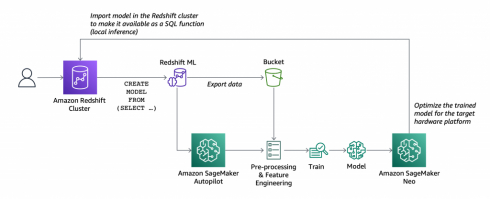
Amazon Redshift ML is now generally available. The cloud data warehouse enables users to create machine learning models and make predictions from data directly from their Amazon Redshift cluster.
Users just have to use a simple SQL query to specify what data they want to use to train their model as well as the output value they want to predict, according to the company.
After the SQL command to create the model is initiated, Redshift ML then securely exports the specified data from Amazon Redshift to the S3 bucket and calls on Amazon SageMaker Autopilot to prepare the data.
Additional details are available here.
Microsoft’s newly announced GPT-3 features
Microsoft announced that GPT-3, the natural language model developed by OpenAI, will be integrated into Microsoft Power Apps, the company’s low-code app development platform.
The new AI-powered features will allow a user that is building an e-commerce app to describe a programming goal using conversational language. A fine-tuned GPT-3 model then offers choices for transforming the command into a Microsoft Power Fx formula.
“Using an advanced AI model like this can help our low-code tools become even more widely available to an even bigger audience by truly becoming what we call no code,” said Charles Lamanna, the corporate vice president for Microsoft’s low code application platform.
OpenCilk 1.0 released
OpenCilk is an open-source implementation of the Cilk concurrency platform that aims to make parallel programming a simple extension of ordinary serial programming through a suite of tools.
OpenCilk compiles Cilk programs using the Tapir/LLVM compiler based on Clang and LLVM. Also, the Cilk runtime system implements a work-stealing scheduler that enables users to schedule the parallel program efficiently on the parallel processors that are available at runtime.
The project currently has many enhancements under development including new language constructs, a new implementation of reducer hyperobjects, various parallel compiler optimizations and more.
Additional details are available here.
Google’s Security by Design
Google launched Security by Design on Google Play Academy to help developers identify, mitigate and protect against security threats through a series of courses.
“Introduction to app security best practices” helps developers take advantage of additional security features to build into an app.
In the next course, developers will learn how to integrate security at every stage of the development process by adopting the Security Development Lifecycle, an industry standard.
Additional details on the courses are available here.






